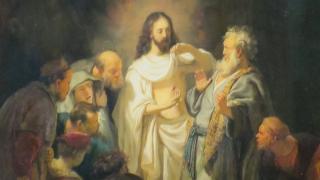April 20, 2025 (EIRNS)—The LaRouche Organization’s Vice President, Christopher Sare, demonstrated this weekend that this question animated not only those who created the Renaissance, but also the formation in the New World of what became the United States.
The basis of rule is not heredity; it is not power; it is not wealth.
How does leadership justify its existence? How does it account for its actions? It is through reason, natural law, and the consent of the governed that government derives its legitimacy.
On the occasion of Easter, let us recall an early expression of this philosophy: “Therefore all things whatsoever ye would that men should do to you, do ye even so to them,” said Jesus in his Sermon on the Mount, according to Matthew.
We quote:
“Love your enemies, bless them that curse you, do good to them that hate you, and pray for them which despitefully use you, and persecute you; that ye may be the children of your Father which is in heaven: for he maketh his sun to rise on the evil and on the good, and sendeth rain on the just and on the unjust.
“For if ye love them which love you, what reward have ye? Do not even the publicans the same? And if ye salute your brethren only, what do ye more than others? Do not even the publicans so?
“Be ye therefore perfect, even as your Father which is in heaven is perfect.”
President Trump took the occasion of Easter to share on Truth Social his own idea of “the golden rule of negotiating and success.” This golden rule, he says, is “He who has the gold makes the rules.”
This statement glorifies raw power over principle, enunciating a worldview where justice, truth, and virtue are irrelevant if you’re rich enough to achieve your aims. It echoes the “might makes right” outlook of Thrasymachus, so devastatingly countered by Socrates in the first book of Plato’s Republic.
Anglo-American NATO is on a road to nowhere if it believes that in 2025, with the growth of additional centers of wealth and power around the world, that it is still possible to assert domination over the entire globe.
Instead, let us take the occasion of the 250th anniversary of the beginning of the American War of Independence, to reflect on the simple but powerful premise of the book that Benjamin Franklin said was to have the greatest influence on his life (excepting the Bible): Cotton Mather’s Essays To Do Good.
“If I have been, as you seem to think, a useful citizen, the public owes the advantage of it to that book,” Franklin wrote in 1784.
In modernized spelling, Mather writes: “There needs abundance to be done, that the miseries of the world may have remedies and abatements provided for them; and that miserable people may be relieved and comforted. The world has according to the computation of some, above seven hundred million people now living in it. What an ample field among all these, to Do Good upon!”
Mather’s proposal: “That we resolve and study to do as much good in the world as we can.”
Now, that’s a golden rule!






